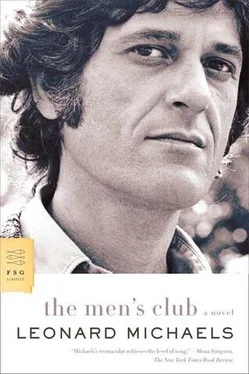Cavanaugh stood for a moment, knife in hand, looking across the knocked-over table and the mess of fish bones, pastry, and broken glass. The kitchen door, his target, had a long rectangular spruce panel in the center and a redwood border. The spruce was stained dark brown.
“Are you serious, Kramer?”
“Throw it, man.”
The knife hit the door, boomed, bounced right, leaving a gouge near the middle. Like an eye. Torn. Weeping splinters.
“Now Paul goes,” said Kramer.
Paul raised the knife to his ear, held it for long seconds, staring at a very particular spot, then threw. The knife stuck in the wall to the left of the door. He gasped, hurrying to the knife, and plucked it out of the wall, trailing plaster dust, leaving a slash in the red paper. He rubbed the edges of the slash together, trying to smooth it away. “Sorry, Kramer. Maybe I don’t have good aim.”
“Canterbury,” said Kramer. “You go now.”
“I’ve never done this before.”
“Just throw it.”
Canterbury raised the knife slowly, pale fingers at the tip of the blade, and threw it, not aiming. The knife made a silvery-blue wheel in the air, hit the center of the door, and stuck, shuddering. The spruce panel was hollow, but there was no boom. His throw had been perfect.
Canterbury put his hands in his trouser pockets and, apologetically, said, “I’ve never done this before.”
“You’re a natural,” said Kramer. “You’re good.”
Terry’s knife flew like a lead pipe, bashing the door, leaving a channel as long as the blade near the border.
My knife stuck, shivered, fell to the floor.
Berliner threw hardest of anyone. His knife stuck at an angle. “I could kill,” he said. “Give me another knife.”
Canterbury’s second throw was also perfect. We cheered. He smiled in a way that could pass for happiness, showing most of his teeth. Kramer didn’t throw any knives. He picked them up after we’d all thrown, and returned them to us, urging us to throw again. After a while, he didn’t have to urge. A rhythm set in, though we were throwing out of turn, two at a time, then two or three at a time. The air was full of steel. The door was gouged and shredded. There was a lot of grunting, wheezing, and more cheers for Canterbury. He seemed, without really trying, incapable of a bad throw. His face became pink and vibrant as he said, “I missed my calling in life.”
Knives were chasing each other across the dining room, booming, bashing against the door, rarely sticking. They bounced away, clattering along the floor or flying into the side of the dish cabinet. One of Terry’s heavy throws bounced up and chipped the ceiling. Berliner whooshed a knife into the wall. The door seemed torn by monstrous fangs. Little remained to make a solid target. In places the spruce was completely smashed away and I could see through into the kitchen. Canterbury, high on his success, began to babble.
“Usually, about this time,” he said, “I’m in my back yard, in robe and slippers, beating my dog with a magazine. He howls when he hears sirens. Every dog in the neighborhood howls when he does. I’d get rid of him, but he’s a gift. An oil man sent him to me from Alaska. Part malamute, part wolf. Enormously impressive animal, but there are sirens almost every night. He howls with ghastly authenticity. I expect to be sued one day.”
“It’s not ghastly,” said Cavanaugh, lowering his knife. There was nothing but splinters and holes to throw at. Terry and Berliner were sitting again. “I used to play summer ball with a team called the Red Wolves. Semi-pro league. When we won a game, the team howled in the locker room, all the players and the coach. It was fine.” He tipped his head back, neck muscles swelling as he pulled in air through funneled lips, hunched his shoulders, and howled: “ Ow-oo-ooo, ow-woo-oo-ooo .”
“Neat,” said Canterbury. A white smile cut the gloomy face neatly. He tipped his head back, stretching the slender pipe of his neck, and howled as if yearning after Cavanaugh’s howl, catching its final note, winding it higher, higher, and higher toward sublimity. Berliner, with lunatic enthusiasm, came wailing after Canterbury. The three of them were howling together. Terry joined with a bellowing howl and then Paul started yipping hysterically. Now all five were doing it, harmoniously overlapping, layering the air with howls.
The ceiling was chipped, the wall beside the door torn, bleeding dusty gas. The dish cabinet carried zigzag gashes down one side. The kitchen door was splinters and the hardwood floor was streaked with wiry lines where blades had skated.
When I howled I felt the vibrations in my head, way up around the sinuses, but I couldn’t hear myself too well. I could hear Kramer, though. Everyone could hear Kramer. Wonderful notes evolved from his darkness. Magnificent tears came down from his eyes.
The howling was liquid, long, and thick in the red room, heart of Kramer’s house. His cherished table lay on its side like a dead beast, stiff-legged and eviscerated, streaming crockery, silver, wine, meat, bones, and broken glass. We sounded lost, but I thought we’d found ourselves. I mean nothing psychological. No psycho-logic of the soul, only the mind, and this was mindless. The table’s treasure lay spilled and glittering at our feet and we howled, getting better at it as the minutes passed, entering deeply into our sound, and I felt more and more separated from myself, closer to the others, until it seemed we were one in the rising howls, rising again and again, taking us up even as we sank toward primal dissolution, assenting to it with this music of common animality, like a churchly chorus, singing of life and death.
Kramer quit howling and said, “I’ll clean up tomorrow,” which made me turn toward the living room, following his eyes and voice. A woman stood on the orange rug, near the open footlocker, among Kramer’s snapshots, his hundreds of other women. We all stopped howling. She glanced from face to face, then to the debris, tracing knife lines through lakes of wine, searching for a theme in too many clues, and then said, “Tonight,” as if he had said that.
He said it: “Tonight.”
Berliner howled. Nobody joined him. He quit, grinned, said, “Hi, Nancy.”
“Hi, Solly.”
“We’ll help clean up,” said Paul. “No trouble, Nancy. Come on, men.”
Nobody moved.
She had a small, tipped-up nose. Soft pointy mouth. Cartoon simplicity. Conventionally pretty. Her voice belonged to another face, older, complicated by experience, not so pretty. I wondered if Kramer had photographed her.
She wore a blue-green blouse; lank, slick material, open to the second button, hanging over the top of her jeans. No bra. Free, indifferent; sexy, but more like self-possessed. The slick material trembled with her breathing. Watery effects. Nothing else showed her distress.
Dark blond hair, parted in the middle, was brushed back toward her ears. Her forehead was high; eyes widely spaced, oval, brown, clearly receptive. They challenged Kramer with patient staring. No judgments in them; she simply expected him to speak. He said, “Hey, you had your hair cut, didn’t you? Looks good. Very very good.”
“I like it, too,” said Paul.
“Thanks,”
“The horizontal look,” said Kramer. “It’s in. Very in. One of my clients had her hair cut for the vertical look. The same day she sees a magazine cover and the model’s hair is altogether fucking opposite hers. She goes vertical, the world goes horizontal. It really bothered her. Made her feel stupid. Vertical when everybody is horizontal. She went deaf for a week.”
“Do you think it’s fair talking about her this way?”
Читать дальше












